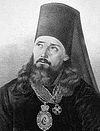

| Previous day | Next day |
| Old Style
March 31
|
Monday |
New Style
April 13
|
|
Passion Week.
Great Lent. |
Monastic rule: xerophagy (bread, uncooked fruits and vegetables).
|
![]() St. Hypatius the Wonderworker, bishop of Gangra (ca. 326).
St. Hypatius the Wonderworker, bishop of Gangra (ca. 326). ![]() St. Jonah, metropolitan of Kiev, Moscow, and all Russia (1461). St. Innocent, metropolitan of Moscow, enlightener of Alaska and Siberia (1879).
St. Jonah, metropolitan of Kiev, Moscow, and all Russia (1461). St. Innocent, metropolitan of Moscow, enlightener of Alaska and Siberia (1879).
St. Apollonius, monk, of the Thebaid (4th c.). Hieromartyrs Abdas, bishop of Hormizd-Ardashir, and Benjamin, deacon, of Persia (418-424). St. Hypatius, abbot of Rufinianus in Chalcedon (ca. 446). St. Hypatius the Healer, of the Kiev Caves (14th c.). St. Philaret, abbot, of Glinsk Hermitage (1841).
Iveron Icon of the Most Holy Theotokos (Mt. Athos).
Righteous Joseph the Fair, son of Jacob (ca. ) (ок 1700 b.c.). St. Acacius the Confessor, bishop of Melitene in Pisidia (251). St. Blaise of Amorium and Mt. Athos (ca. 908).
Repose of Archbishop Averky (Taushev) of Syracuse and Holy Trinity Monastery (1976), Schemanun Anastasia (Shevelenko) of Karaganda (1977), and Archimandrite Thaddeus (Tadej) (Shtrbulovich) of Vitovnica Monastery, Serbia (2003).
Thoughts for Each Day of the Year
According to the Daily Church Readings from the Word of God
By St. Theophan the Recluse

Monday (Holy Week). [Matt. 24:3–35]
The Lord goes to a voluntary passion. We must accompany Him. This is the duty of anyone who confesses that by the power of Christ’s passion he has become who he is now, and of anyone who hopes to receive something which is so great and glorious, that it could not even enter one’s mind. How must one accompany Him? Through reflection and sympathy. Follow the suffering Lord in thought; and in your reflection extract such impressions as could strike your heart and bring it to feel the sufferings which were borne by the Lord. In order to better accomplish this, you must make yourself suffer through perceptible lessening of food and sleep, and an increase in the labour of standing and kneeling. Fulfil all that the Holy Church does, and you will be a good fellow-traveller of the Lord to His sufferings.
Articles
 St Jonah the Metropolitan of MoscowSaint Jonah, Metropolitan of Moscow and Wonderworker of All Russia, was born in the city of Galich into a pious Christian family. |
 Icon of St. Innocent of Moscow weeping myrrh In KhabarovskThe unusual phenomenon was noticed by the seminary aspirants who came to take entrance examinations. |
 Venerable Apollonius, Ascetic, of EgyptSaint Apollonius, when he was a fifteen-year-old youth, withdrew into the inner Thebaid desert (Lower Egypt), where he spent forty years in monastic struggles. |
 Venerable Hypatius the Healer of the Kiev CavesSaint Hypatius the Healer of the Caves, attained glory through his severe fasting and prayerful vigilance. |







